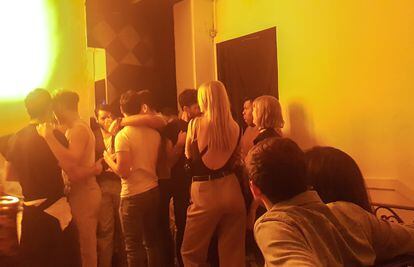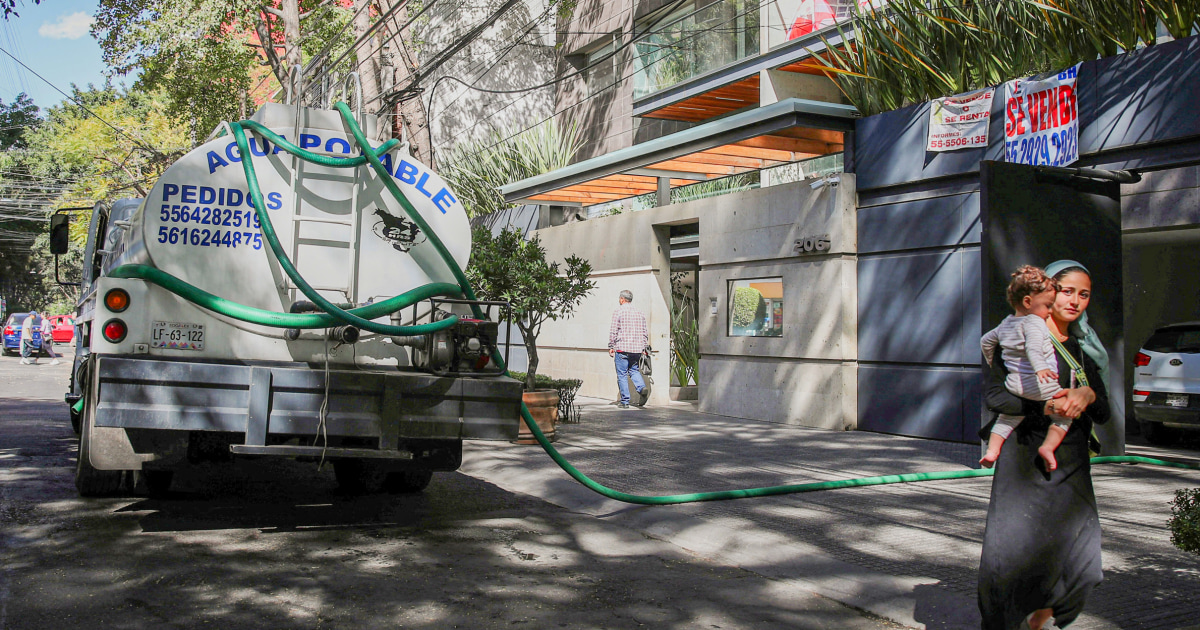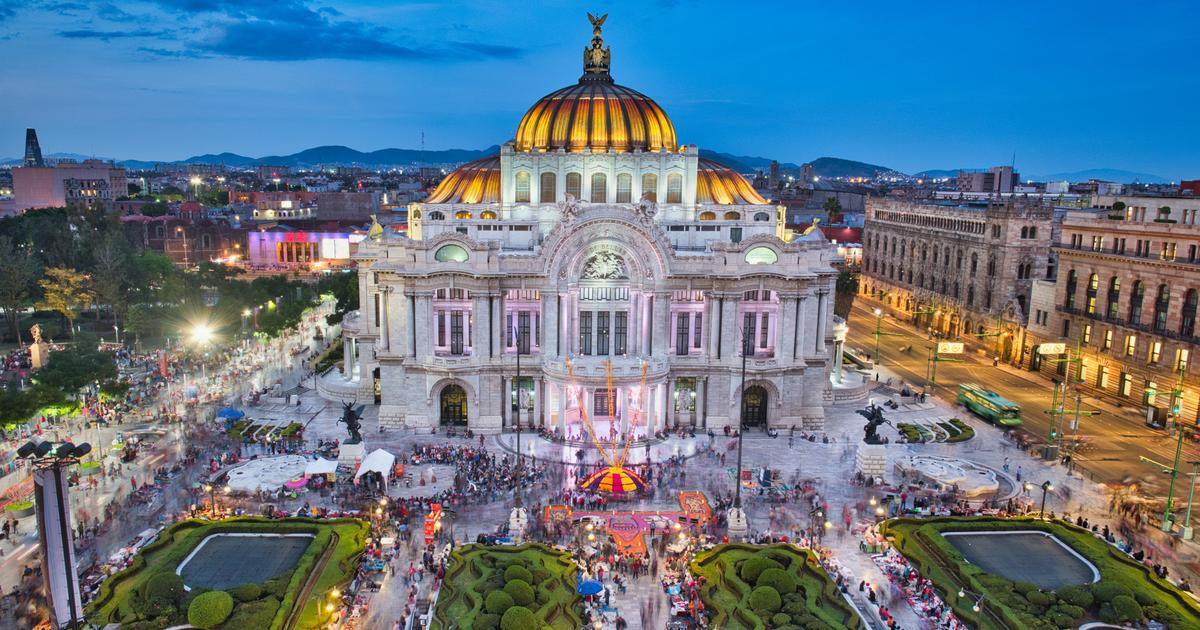Diego (not his real name) does not want surprises and puts the cards on the table from the beginning. "If someone asks, this is a restaurant," says the waiter to his customers. Until that moment, the bar where he works had followed the entire protocol against covid-19 to the letter, as well as other rituals that arose with the pandemic. There were the sanitizing mats, the gun-shaped digital thermometers, the antibacterial gel dispensers. There was only one condition to enter out of the ordinary. "I need you to allow me your cell phone," one of the security guards asked, while peeling off two small white labels, one for each camera on the phone. "Guys, please, no photos when they come in."
It's already past ten at night and there are only a couple of tables left on the terrace with customers who are about to pay the bill to finish the pre-production and move to another place. Inside, the employees have already drawn the black curtains and Diego's "restaurant" is in full metamorphosis. “The good stuff starts at eleven o'clock, they're going to see how this is going to turn out,” anticipates Nina, the waitress captain. At the point of the hour, seen from outside, the bar is dead and officially closed. Behind the scenes, bottles arrive between flares and wooden chests, steam from water pipes seeps into crowded hallways, and remixes of songs from the eighties and nineties echo against the walls. The only people who wear a mask are the service personnel.
Discos and nightclubs have been left out of Mexico City's economic reopening plan. At an orange traffic light, the second alert level of the four-color traffic light established by the federal government, bars and restaurants can open, but with limited capacity and hours, and they have to seek to place most of their attendees in ventilated spaces. The Mexican Association of Bars, Discotheques and Nightclubs in January called a demonstration in the capital with empty glasses, for the loss of 300,000 jobs and more than 400,000 jobs threatened throughout the country, according to its own calculations. Since last year, some owners of the food and beverage industry secretly opened to serve friends and family, although the accounts hardly came out. This last month,several posts on social media reported on the latest rebellion of the
dens
, as they are known in the country, against the prohibition of the authorities.
And the glasses were refilled.
Drinks on the bar of a clandestine club in Mexico City seila montes
"We opened two or three weeks ago," says Gerardo, one of the partners of the place, who raises his arms to show that the bar is bursting.
"We're doing very well, thank God," he adds, while walking with a shirt slightly ajar with the image of the Virgin of Guadalupe, "the
staff
He asked us, they couldn't wait any longer ”. The bar opened in Santa Fe, the most modern area of the capital, which is home to skyscrapers and neighborhoods with a development rate similar to that of Germany and some of the most marginalized neighborhoods in the city. Gerardo is less histrionic when he explains the owners' decision to go back into business. “How many girls from that table have already gone to Houston to get vaccinated?”, He says after asking the rhetorical question, “these people have a lot of money and they will continue to go out and spend with or without a pandemic, if they do, what do here ”.
They are not the only ones. In the same square, a well-known nightclub has opened for the second week in a row. There are no advertisements or official announcements, but word spread fast. To get there you have to go through the kitchen and go out the back door of the first bar. The entrance is through the parking lot, where everything that until last year was seen at street level has been replicated: the so-called chain, the security filters and the parade of luxury cars and escort vehicles.
There are some changes such as nebulizers that spray each of the attendees, although their usefulness is in question. The screens that projected the videos of the songs now insist in English that the photos and recordings are not allowed under the implicit threat of removing the phone or, eventually, being thrown out. The rest continues as before. Tables are assigned from the purchase of two bottles, some in a price range of several hundred dollars. There are all the elements to conquer the escape from the pandemic: Reggaeton makes everyone dance, dating gives hope to singles, face masks and social distancing are non-existent. "The covid does not exist," says one of the assistants in the bathrooms. "We are worth mothers," one of his friends replies.
On the boulevard, about 500 meters from the sites that are supposedly closed, the Police have installed a breathalyzer.
Just over two miles away, also in Santa Fe, a clandestine dive takes things to another level.
In front of a kind of hatch in the ground, similar to the entrance to a bunker, security guards dressed in jackets and ties guard the entrance of the club.
Before the pandemic,
speakeasy
, bars inspired by the time of prohibition in the United States and that had fronts of other businesses such as flower shops and dry cleaners,
became fashionable
.
The idea was to sell the experience of reaching hidden clubs, which were entered through secret passages.
Now it is not marketing, but a survival mode.
People dance in a clandestine nightclub in the Mexican capital. Seila montes
The entrance of the club in question begins in a park adjacent to a futuristic shopping center that has several stores on a sublevel.
The hatch leads to the back room of those premises.
It is a maze in gray work, in which you have to go down several stairs that pass through concrete tunnels.
If you looked from the mall, you would see a store undergoing renovation: with cans of paint, wooden planks and sheets.
Next door is a somewhat modest bar, with the bare minimum: restrooms, tables, more security guards, a
dj
, a small bar, and individual mattresses in the corners.
Photos are also prohibited.
"The point is not the place," explains one of the attendees, "but that you find it and you can pass."
Admission is exclusive to friends and acquaintances of the owners, who have mounted a
after hours
that closes until dawn.
The invitations are more and more common and the options, more varied: clubs that lower the curtain, rooftops that become bars, discos hidden under the facades of buildings and old acquaintances who have returned to claim their clientele, from the wealthy neighborhood from Polanco to the housing units in popular areas. In the Juárez neighborhood, in the center of the city, an old automotive workshop is transformed every Saturday into a gay electronic music club. It has no marquee or advertisements, and it tries to keep its customers from spending a lot of time on the street so as not to arouse suspicion. "I already needed it, even though I know I'm playing it," says Arturo, after ordering the first drink. In the midst of a normalcy that refuses to arrive, in the region of the country hardest hit by the pandemic, the cups have been filled again.
Subscribe here
to the
newsletter
of EL PAÍS México and receive all the informative keys of the current situation of this country









/cloudfront-eu-central-1.images.arcpublishing.com/prisa/Z6YMDVPE2NHHTGDHDZ4XH5MOFM.jpg)





